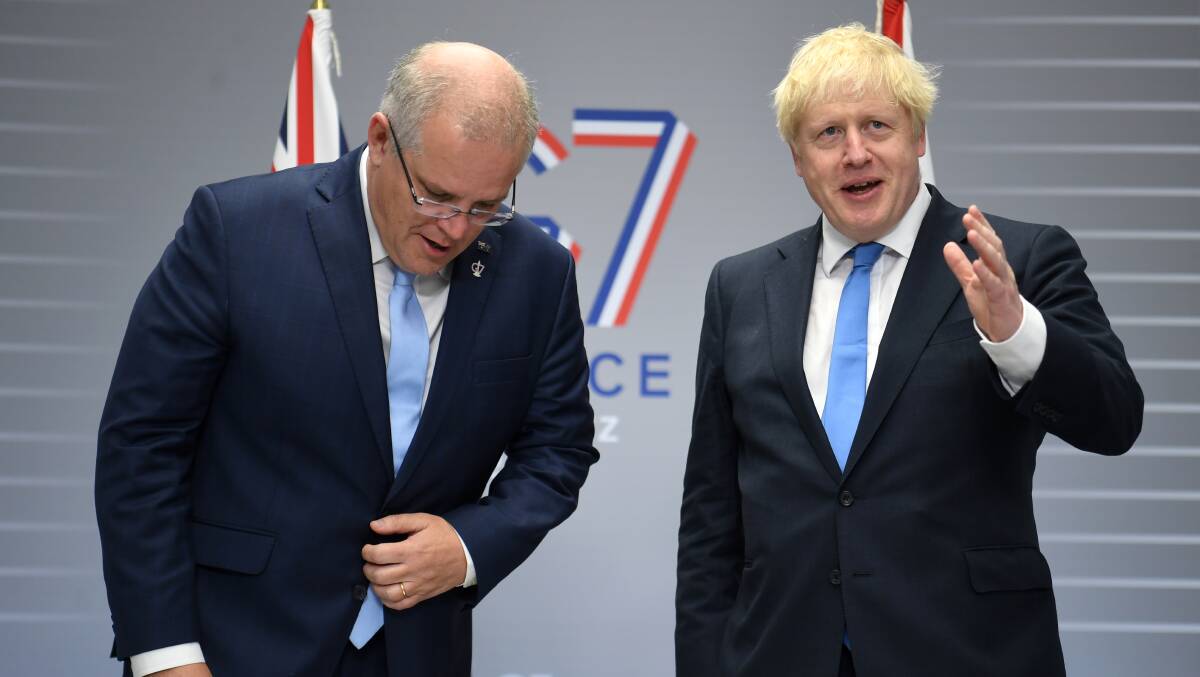 |
| Australian Prime Minister Scott Morrison and his UK counterpart Boris Johnson are ideological bedfellows but have very different ambitions on climate. Picture: Getty Images |
Author Steph Hodgins-May is Greenpeace Australia's head of Pacific. She is an environmental lawyer and climate campaigner with extensive experience in strategic planning and advocacy. Steph Hodgins-May holds a Bachelor of Law & Arts and a Master of International Relations from Deakin University. |
A month out from US President Biden's global climate summit, the hot air is rising as our Prime Minister pushes for Australia's climate track record to be vindicated by his international counterparts.
Just this month a new policy brief by Canberra climate experts revealed Australia won't meet net-zero emissions by 2050 with its current effort.
Australia's poor climate performance has not gone unnoticed internationally, with our country regularly in the bottom ranks of global climate action trackers.
Now, with renewed climate ambition from the US, a vow from Boris Johnson to put climate change at the forefront of his international policy, and the introduction of carbon border tariffs in the EU, Australia is increasingly looking like a poor player in the global effort to tackle climate change.
Australia's climate policies not ambitious enough for summit invite, Boris Johnson told Scott Morrison https://t.co/9RrPL1rUwh by @adamlmorton pic.twitter.com/6BSPiX2UqnAt the global climate summit, that will all come out in the wash, with Australia set to be embarrassed and isolated. Scott Morrison, one eye to marketing as always, is looking to manage the expected fallout.
— Elouise Fowler (@ElouiseFowler) March 24, 2021
Morrison's attempt at expectations management is yet another example of the PM putting politics before policy.
Rather than leading by outlining a vision and plan to get there, Morrison is trying to spin his way out of trouble and claim credit for the work of others, namely state governments that are most responsible for the drop in Australia's emissions through their renewable energy targets.
Strong leaders are ambitious and agenda-setting but like Morrison's handling of sexual assault allegations, the climate issue has exposed him as a man without a plan.
When it comes to climate policy, Morrison agrees that ambition is important but says he wants to be judged on his "achievements". Let's take a look at what the Morrison government has achieved so far on emissions reduction.
Scott Morrison leads a government that has not had a national climate policy for years. Under his leadership, Australia was one of only a handful of countries seeking to use Kyoto carryover credits to meet emissions-reduction targets under the Paris Agreement.
Morrison has encouraged the export of ever more fossil fuels, which are responsible for around five times Australia's massive domestic emissions. His government gifts around $12 billion of taxpayer money to the coal, oil and gas industries every year.
As PM, Morrison has steadfastly opposed measures to reduce emissions, protected members of his government who are straight-up climate-denialist conspiracy theorists, and recently supported climate action-blocker Mathias Cormann to become secretary-general of the OECD.
As other countries around the world, including Australia's major trading partners, take steps to decarbonise their economies and achieve net-zero emissions, Morrison has tried to keep highly polluting coal-burning power stations running, and advocated for Australia's recovery from the pandemic to be powered by another climate-destroying fossil fuel, gas.
But the height of this hypocrisy is reserved for the people that Morrison calls "family", our Pacific neighbours, who stand to be more impacted by climate change than any other region in the world.
In a recent opinion piece co-authored by Morrison and the leaders of the US, Japan and India, Morrison said "we will work together and with others to strengthen the Paris Agreement, and enhance the climate actions of all nations".
These words mean nothing when Morrison has ignored Pacific leaders' consistent calls for Australia to reduce its emissions, despite his government signing onto communiques and declarations that recognise climate change as the number one threat to the Pacific.
As the world's largest coal exporter and the largest per capita emitter, Australia has a responsibility to help protect Pacific Island nations from the devastating impacts of climate change such as cyclones and sea-level rises that threaten to submerge entire nations beneath the waves.
Morrison has shirked many chances to lead, but as the urgent need to prevent the climate crisis grows, opportunities continue to arise. Biden's climate summit is the first, but soon after there is the Pacific Islands Forum and then COP26 in Glasgow.
Try as he might to avoid it, Morrison could still have greatness thrust upon him. He just has to "step up" to the challenge, listen to his Pacific counterparts and join them in leading on climate.
Looking backwards and side-stepping ambition won't save the Pacific, and it won't save us.
Links
- (AU) Biden Invites Morrison To Climate Summit, Urges Lift In Ambition
- (AU) Wake Up, Mr Morrison: Australia’s Slack Climate Effort Leaves Our Children 10 Times More Work To Do
- (AU) PM’s Claim Australian Coal Produces Much Lower Emissions Is ‘Nonsense’
- (AU) Australian PM Faces Pressure On Climate Policy But Has To Deal With Resistance In His Ruling Coalition
- (AU) As Biden Hits The Accelerator On Climate Action, Australia Remains Stuck In Policy Paralysis
- (AU) The Verdict On Australia’s Emissions Targets: Catastrophic
- (AU) Silent Treatment: How Scott Morrison Earned Boris Johnson's Climate Summit Snub
- (AU) Scott Morrison's Climate Language Has Shifted – But Actions Speak Louder Than Words
- Australians across political divide want climate action: ANU survey
- Philip Citowicki: It's in the Coalition's best interests to set more ambitious climate goals
- Adrian Zammit: There's no vaccine that will protect us from climate change

No comments:
Post a Comment